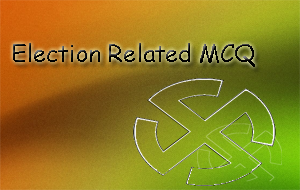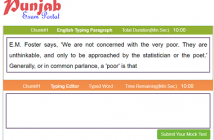1) Which Article in the Indian Constitution provides for the Election Commission?
a) Article 324
b) Article 128
c) Article 256
d) Article 378
2) Who appoints the Chief Election Commissioner of Election Commission?
a) Prime Minister
b) Chief Justice of India
c) President
d) Lok Sabha
3) Currently, there are how many members in the Election Commission?
a) 1
b) 2
c) 3
d) 4
4) When was the Election Commission formed?
a) 1947
b) 1948
c) 1949
d) 1950
5) What is the tenure of office for the Chief Election Commissioner?
a) 5 years or 65 years, whichever is earlier
b) 6 years or 60 years, whichever is earlier
c) 6 years or 65 years, whichever is earlier
d) 5 years or 60 years, whichever is earlier
6) Where are the headquarters of the Election Commission of India situated?
a) Mumbai
b) New Delhi
c) Bangalore
d) Gurgaon
7) Who was the first woman to become a Chief Election Commissioner of India?
a) V. S. Ramadevi
b) G. D. Das
c) S.K. Bedi
d) R.M. Nikam
8) For the Election Commission, at the district level, who acts as the district returning officer?
a)) District Collector
b) Police Commissioner
c) Tehsildars
d) None of the above
9. The maximum age prescribed for election as president is
(a) 58 years
(b) 62 years
(c) 60 years
(d) No such Limit
10. The power to decide an election petition is vested in the
(a) Supreme Court
(b) High Court
(c) Election Commision
(d) Parliament
11. To elect the President of India, which one of the following election procedures is used ?
(a) Secondary voting system
(b) System of propotional representation by means of the single transfereable vote
(c) Propotional representation through list system
(d) Collective Voting system
12. In which year were the first general election held in India ?
(a) 1947-48
(b) 1948-49
(c) 1950-51
(d) 1951-52
13. Which among the following is not a part of the electoral reforms ?
(a) Installation of electronic voting machines
(b) Appoinment of election Commissioner
(c) Registration of Political parties
(d) Disquallifying the offenders
15. Recognition to a political party is accorded by
(a) The Election Commision
(b) A Committee of Whips
(c) The ministry of parliament Affours
(d) The speaker of the Lok Sabha in the case of national Parties and the Speaker of Legislative assemblies in the case of regional parties
16. The Chief Minister of a state in India is not eligible to vote in the Presidential election if
(a) He himself is a candidate
(b) He is a caretaker Chief Minister
(c) He is yet to prove his majority on the floor of the Lower House of the state Legislature
(d) He is a member of the Upper House of the State Legislature
17. Which of the following is not a feature of Election system in India?
(a) Universal Adult Franchise
(b) Secret Voting
(c) Reservation of seats in the legislature for the members of Scheduled Castes and Scheduled Tribes
(d) Communal Electorate
18. Elections in India for Parliament and State Legislatures are conducted by
(a) President
(b) Prime Minister
(c) Governor
(d) Election Commission of India
19. By-Election is the election which is held
(a) directly
(b) indirectly
(c) to fill up a vacancy in the legislature
(d) when a legislature is dissolved before the expiry of its normal term.
20. In Democracy Elections are important because
(a) The formation of government becomes easy
(b) They help in the formation of opposition party
(c) They are a check on the working of the government
(d) All of the above
21. Following is a weakness (challenge to) Indian election system:
(a) Secret Ballot
(b) Use of Electronic Voting Machines
(c) Misuse of Official Machinery
(d) Universal Adult Franchise
22. Who of the following has the responsibility of the registration of voters
a) Individual voters
b) Government
c) Election commission
d) Corporations
23. Democracy exists in India, without peoples participation and co operation democracy will fail. This implies that
a) Government should compel people to participate and cooperate with it
b) People from the government
c) People should participate and cooperate with the government
d) India should opt for the presidential system
24. Which of the following are not the functions of the election commission
1) Conduct of election for the post of the speaker and the deputy speaker, Lok sabha and the deputy chairman, Rajya sabha
2) Conduct of elections to the state legislative assemblies
3) Deciding on all doubts and disputes arising out of elections
a) 1 and 2
b) 1 and 3
c) 2 and 3
d) 2
25. Which of the following electoral systems have not been adopted for various elections in India
1) System of direct elections on the basis of adult suffrage
2) System of proportional representation by means of single transferrable vote
3) List system of proportional representation
4) Cumulative system of indirect election
a) 1, 2
b) 1, 3
c) 2, 3, 4
d) 3, 4
26. If an election to a state Legislative Assembly the candidates who are declared elected loses his deposit, it means that
a) The polling was very poor
b) The election was for a multi member constituency
c) The elected candidate victory over his nearest rival was very marginal
d) A very large number of candidates contested the election





11 Comments
sir g, pls ye wali pdf send krdo MCQ
sir , can you please post some questions of municipal act 1930 and 1911
Plz tell me sir how can I download this msq
password – punjabexamportal
sir election relates and general science ka material download nhi ho raha ?
please send me link or send me file.
Increased Download limit, Download now, Password -punjabexamportal
thanks a lot sir
plz send me email of this topic at simran.shilpi@gmail.com
Download please, Password-punjabexamportal
sir,yeh download he nhi ho rha password wrong bta rha hai
Password sahi hai, Caps lock check kar lio
any body is there who can provide me answer keys of all the assistant and inspector mcq with the pdf …if anyone then plz mail me out on vikramkaushal792@gmail.com